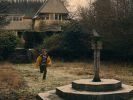Eye For Film >> Movies >> Blackwood (2013) Film Review
Isolated, creaky and old, Blackwood is a residence with history - ghosted not just by the stories and artworks of its former occupants, but also by the traditions of one of horror cinema's oldest modes, the 'haunted house' subgenre. So in a sense Dr Ben Marshall (Ed Stoppard), an academic historian with his own troubled past, is right at home here.
Recovering from a nervous breakdown, Ben has left Oxford for a smaller university, and moved into Blackwood with his wife Rachel (Sophia Myles) and young son Harry (Isaac Andrews), hoping to make a new start. Except that Ben and Rachel's old friend the geneticist Dominic (Greg Wise) has followed them, dredging up their tangled history together even as he researches local neanderthal archaeology with his flirtatious young assistant Jessica (Joanna Vanderham). "I left Oxford to get away from you", Ben complains to Dominic, only half-joking - but the historian has other, more immediate problems on his mind, visiting him first at night, and soon in broad daylight.

Blackwood, you see, is haunted. A clock, unwound and stopped at 4.10, still chimes in the wee hours, heralding the incursion of sourceless door knocks, bloody hands, spinning objects and a ghostly, masked boy clutching a machete. At first only Ben seems to see these irrational irruptions, but soon Harry too is noticing - and pursuing - a phantom playmate. Ever the obsessive historian, Ben investigates the house's past, and discovers a photograph of a boy and his mother who had both lived there some time ago before mysteriously disappearing - and as his suspicions grow about the missing woman's husband Jack (Russell Tovey) and the secretive local priest (Paul Kaye), both veterans of the Middle East conflict, we are left wondering if Ben is unearthing a buried past, or just digging a hole for himself Oedipus-style.
Trying to inspire his bored-looking students, Ben suggests to them that the pursuit of history can be forward- as well as backward-looking, allowing us to learn from past mistakes and evolve as a species beyond our genetic programming. These are, naturally, important themes in a film that pits a historian against a geneticist, in a house where all manner of atavistic urges will resurface - for Blackwood concerns characters trying to escape their pasts and forge new futures, even if their own neanderthal drives prove difficult to keep buried.
Yet it is perhaps the warning with which Ben ends his lecture, about the potential pitfalls of historical reconstructions, that resonates most deeply through Blackwood's corridors: "Never fill in the gaps with what you want to believe - no prejudice, no agenda." For with these words, director Adam Wimpenny and writer JS Hill are challenging us to plot a new interpretative course through the hoary horror clichés - dodgy electrics, creepy kids, spooky basements, eyes in keyholes, noises off - that they keep hurling at us and that seem, at least at first, impossible to reconcile and synthesise into a coherent story.
Of course, good ghost stories require ambiguous spaces into which their uncanny spirit can slip, and Blackwood comes with these in abundance, as Ben's medicalised psychology collides with hallucinatory apparitions, leaving plenty of room for uncertainty as to whether the dark secrets gradually being exposed belong to Blackwood itself or to Ben's unraveling mind. So while Rachel, when she declares, "It needs a key", is referring specifically to the house's old grandfather clock that, left unwound, has long since ceased marking conventional chronology, her words also point to the cogs and gears of the film's narrative.
This is, in fact, both the best and the worst thing about Blackwood. For while its machinery is all precisely calibrated, once the key has been found to its inner workings all ambiguity vanishes, and we are left merely to admire the convoluted, paradoxical intricacy of the clockwork. This film really does do something genuinely new with its old, grinding tropes - but once the veil has been lifted, the mask removed and the mechanics beneath all these devices exposed, no mystery remains. Blackwood ends with an expository disinterment of a truth that the film had earlier half-concealed and half-revealed. And while you can certainly appreciate the immense craft and workmanship that has gone into this game of hide and seek, disorientation always trumps explanation in tales of the supernatural - or, to put it another way, needing a key is better than actually having one.
Reviewed on: 20 Oct 2013

















